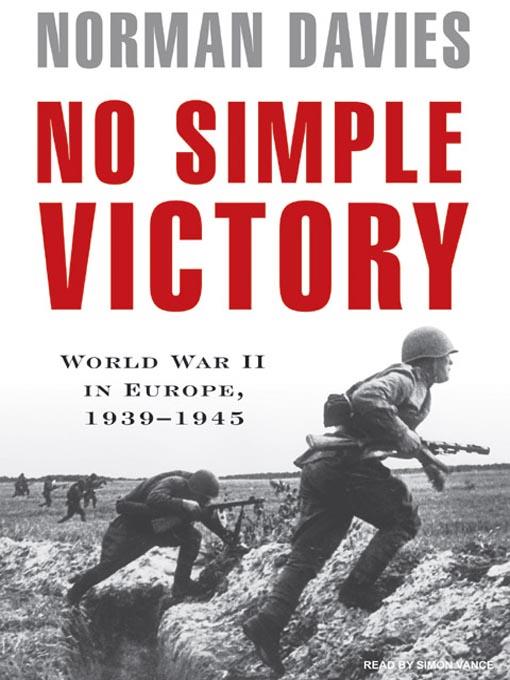
No Simple Victory
World War II in Europe, 1939-1945
فرمت کتاب
audiobook
تاریخ انتشار
2007
نویسنده
Simon Vanceناشر
Tantor Media, Inc.شابک
9781400174683
کتاب های مرتبط
- اطلاعات
- نقد و بررسی
- دیدگاه کاربران
نقد و بررسی

NO SIMPLE VICTORY is no simple book. Rather than chronicle WWII from beginning to end, the author explores hundreds of its skirmishes and principal characters in no seeming order. He throws out the names of battles, generals, and politicians without assignation, as though we know them all from a previous life. With an aristocratic British accent, Simon Vance does his best to turn a dry and confusing narrative into a pleasant experience. He performs well with French and Russian names but occasionally loses the last word of a sentence. After hearing Vance adopt the author's attitude and read his flight of opinions, the listener might mistake the narrator for Davies himself. J.A.H. (c) AudioFile 2008, Portland, Maine

June 25, 2007
The typical Western view of WWII's European Theater—as a struggle between freedom and fascism that climaxed with the Normandy landings—is harshly critiqued in this scathing reappraisal. Historian Davies (Rising '44: The Battle of Warsaw
) argues that British and American campaigns were a “sideshow†to the titanic conflict between the Wehr-macht and the Red Army on the Eastern Front, where most of the fighting and decisive battles occurred. The war was therefore not a “simple victory†of good over evil, he contends, but the defeat of one totalitarian state, Nazi Germany, by another, the Soviet Union, whose crimes were just as vast, if less diabolical. Davies's topical approach judiciously surveys the military, economic and political aspects of the war, often from an Eastern European perspective. He observes, for example, that the region that suffered the most civilian deaths was Ukraine, and that the Soviet Union was initially as much an aggressor—against Poland, Finland and the Baltic states—as Germany. (Poland's travails, Davies's professional specialty, are somewhat overemphasized.) Davies cuts against the grain of popular war histories like Stephen Ambrose's accounts of D-Day and the Bulge, but his interpretations rest on solid scholarly work. Photos.

























دیدگاه کاربران